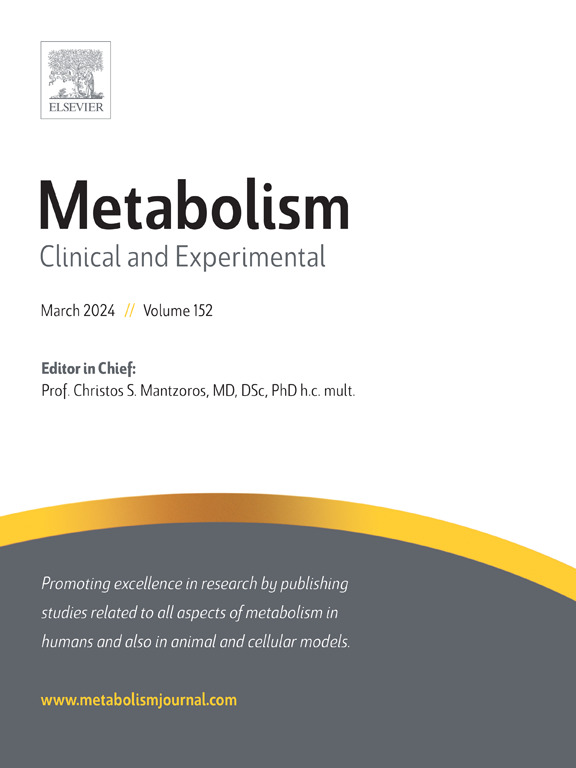新陈代谢和疾病中的 PCSK9。
IF 11.9
1区 医学
Q1 ENDOCRINOLOGY & METABOLISM
引用次数: 0
摘要
PCSK9 是一种丝氨酸蛋白酶,通过介导肝脏中低密度脂蛋白受体(LDLR)的溶酶体内降解,调节血浆中低密度脂蛋白(LDL)和胆固醇的水平。当 PCSK9 的功能不受控制时,它会导致 LDLR 的降解增加,从而导致循环中的低密度脂蛋白和胆固醇水平升高。这种失调会导致脂质和胆固醇代谢异常、泡沫细胞形成以及各种疾病的发生,包括心血管疾病(CVD)、病毒感染、癌症和败血症。新出现的临床和实验证据凸显了 PCSK9 在高胆固醇血症和高脂血症等代谢异常、炎症和线粒体平衡紊乱中的重要作用。此外,代谢激素(包括胰岛素、胰高血糖素、脂肪因子、利钠肽和性类固醇)会调节 PCSK9 的表达和循环水平,从而影响心血管和代谢功能。在这篇综述中,我们旨在阐明 PCSK9 在脂质和胆固醇代谢、心血管疾病、感染、癌症和败血症等疾病的病理生理学中的调控作用,以及针对这些疾病的药物和非药物治疗方法。本文章由计算机程序翻译,如有差异,请以英文原文为准。

PCSK9 in metabolism and diseases
PCSK9 is a serine protease that regulates plasma levels of low-density lipoprotein (LDL) and cholesterol by mediating the endolysosomal degradation of LDL receptor (LDLR) in the liver. When PCSK9 functions unchecked, it leads to increased degradation of LDLR, resulting in elevated circulatory levels of LDL and cholesterol. This dysregulation contributes to lipid and cholesterol metabolism abnormalities, foam cell formation, and the development of various diseases, including cardiovascular disease (CVD), viral infections, cancer, and sepsis. Emerging clinical and experimental evidence highlights an imperative role for PCSK9 in metabolic anomalies such as hypercholesterolemia and hyperlipidemia, as well as inflammation, and disturbances in mitochondrial homeostasis. Moreover, metabolic hormones – including insulin, glucagon, adipokines, natriuretic peptides, and sex steroids - regulate the expression and circulatory levels of PCSK9, thus influencing cardiovascular and metabolic functions. In this comprehensive review, we aim to elucidate the regulatory role of PCSK9 in lipid and cholesterol metabolism, pathophysiology of diseases such as CVD, infections, cancer, and sepsis, as well as its pharmaceutical and non-pharmaceutical targeting for therapeutic management of these conditions.
求助全文
通过发布文献求助,成功后即可免费获取论文全文。
去求助
来源期刊

Metabolism: clinical and experimental
医学-内分泌学与代谢
CiteScore
18.90
自引率
3.10%
发文量
310
审稿时长
16 days
期刊介绍:
Metabolism upholds research excellence by disseminating high-quality original research, reviews, editorials, and commentaries covering all facets of human metabolism.
Consideration for publication in Metabolism extends to studies in humans, animal, and cellular models, with a particular emphasis on work demonstrating strong translational potential.
The journal addresses a range of topics, including:
- Energy Expenditure and Obesity
- Metabolic Syndrome, Prediabetes, and Diabetes
- Nutrition, Exercise, and the Environment
- Genetics and Genomics, Proteomics, and Metabolomics
- Carbohydrate, Lipid, and Protein Metabolism
- Endocrinology and Hypertension
- Mineral and Bone Metabolism
- Cardiovascular Diseases and Malignancies
- Inflammation in metabolism and immunometabolism
 求助内容:
求助内容: 应助结果提醒方式:
应助结果提醒方式:


